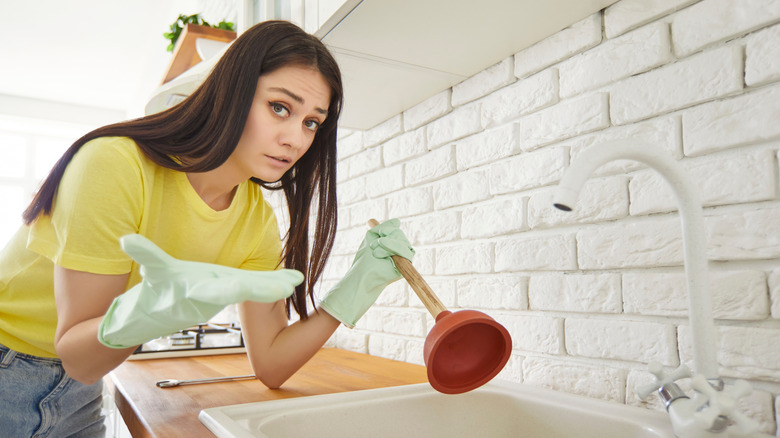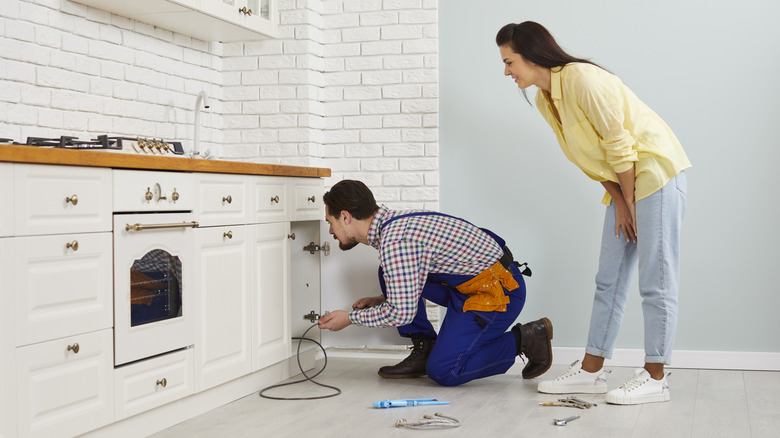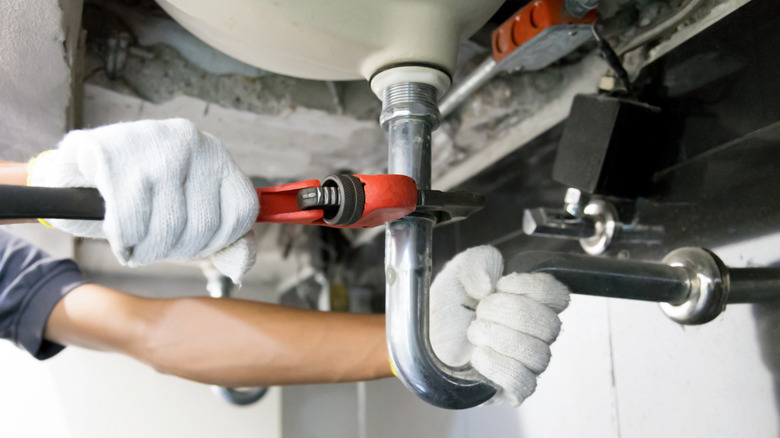Signs It's Time To Call A Professional For Your Clogged Drain
When you have a clogged drain, it can lead to issues like disgusting odors, mildew and mold, and the appearance of flies, roaches, and other insects. If you have this problem — and considering plumbers charge an average of $90 per hour – you may initially try to solve the problem with an affordable way to unclog drains using household items. Unfortunately, many plumbing problems simply aren't solvable with DIY solutions. Some DIY plumbing mistakes can cause more damage than you might think. If you see certain signs associated with your clogged drain, like bad smells, odd sounds, and pooling water, these indicate that it's time to skip the DIY and call a plumber.
The clearest sign that you should call a plumber immediately for your plugged drain is water standing in a sink or shower. This potentially is a dangerous situation because it could be a sign that you have a problem with your sewer line. Backed-up sewage could eventually enter your home, especially if the clog is in the lowest point in the house. Additionally, when a sink or shower has standing water because of a malfunctioning drain, you lose the ability to use the appliance, causing frustration for your family. The problem might be as simple as pulling hair out of a plugged drain or as complex as the plumber needing to access your sewer cleanout pipe that is vital for emergency situations. Apart from backed-up water, there are other signs that you should call a plumber for a clogged drain.
Slow drains or persistent clogs need a plumber
If you tried to treat your drains with chemical cleaners or DIY solutions, you may have solved the symptoms of slow-moving water, but you might not solve the underlying problem. Some DIY drain-clearing techniques are only temporary solutions. Even chemical drain-clearing products usually only provide temporary relief from the effects of the clog. If you had success clearing a clog on your own, but it seems to come back within a couple of weeks, you probably need an inspection from a plumber because the source of the clog is deeper in the plumbing system than you might be able to reach on your own. A professional plumber can remove whatever obstruction you have in your sewer pipes, regardless of its location.
Water backing up in unusual places is another reason to call an expert. The problem might not relate to a clog where you're seeing the water. For example, water pooling in a bathtub after running the dishwasher, could mean there's a clog in the sewer line that serves your home rather than in the bathtub drain. Water flowing out of drains for the fixtures in the basement or lowest floor of your house is a common issue with a sewer line blockage. Although you could DIY clearing the sewer line, you'll probably have to rent the equipment with no guarantee of success. Plumbers will study the type of blockage to determine the best way to successfully remove it and return your sewer system to normal.
Plumbers can help with odd-smelling drains making weird noises
If your plugged-up sink is draining just enough to avoid having standing water, you might think you don't need to worry about it. However, if you notice odd odors related to the slow-draining sink, you should call a plumber for help. The odor may indicate issues like bacteria feeding on small bits of food or greasy buildup in the drain. It might also show a malfunctioning or clogged P-trap, which is a curved section of drain pipe under the sink. The causes of the odors won't magically disappear. Instead, the problem may continue to worsen. Eventually, this problem could lead to costlier repairs in the future.
Further, a slow-moving or plugged drain accompanied by gurgling sounds may signal air is trapped in the pipes. This is often a sign of a severe blockage somewhere deep in the sewer line that requires a plumber's help. Even if the noises only relate to a partial blockage in the drain, you should have a plumber resolve it before it worsens and causes a sewer backup.
Whistling sounds too could indicate there's a blockage in the venting system. All residential sewer systems require a plumbing vent that allows air to escape. If it has blockages from a bird nest or another issue, restricted air may whistle. You might also notice slow drains or gurgling sounds because of negative air pressure building up in the system. If so, it's best for a plumber to inspect and fix the vent.


